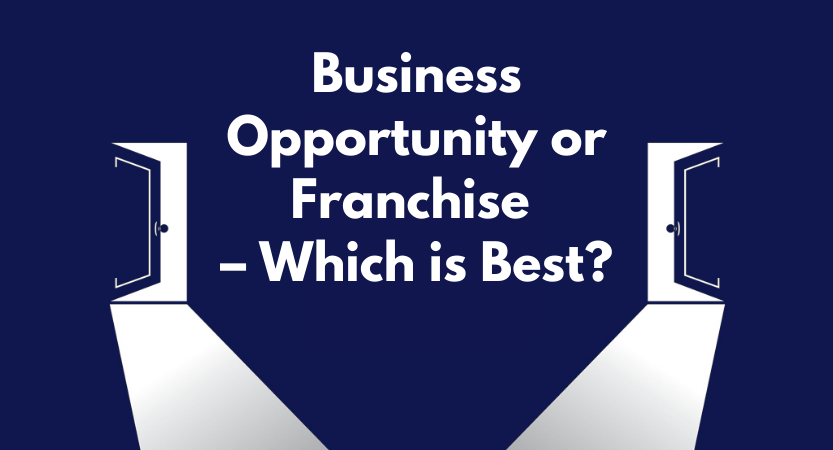There are two viable options for becoming a business owner. It is either through a business opportunity or a franchise business that you may avoid reinventing the wheel and beginning your own business from scratch.
Each has its own set of benefits and drawbacks. Before you start looking for a specific business, you need understand how each one works and how you would fit into their plan.
Which Is Best – Own Business or Purchased Franchise
Let’s look at each one and see which one has the most points to have a better idea of the answer.
Business Opportunity
You buy and own a business outright with a business opportunity, and you can operate it under whatever name you like. The supplier earns money by providing the buyer with the business system, training, equipment, or service approach.
In some situations, the seller may be able to earn residual income from product sales that continue to be made. These can also be in services, but the relationship is usually over as the purchase is completed.
Government Protection
A business opportunity is not regulated by the federal government. Some states encourage, but most do not mandate, a generic form of disclosure before to purchase. If a disclosure paper is provided with a business opportunity, it may merely provide generic information.
The lack of regulation can make the purchasing process go more quickly. However, the buyer is still responsible for conducting a comprehensive examination of the company. There are no continuous royalty payments with a business opportunity, for example.
The buyer has complete control over how the firm is run. On the negative, the seller has no vested interest. To assure the buyer’s success in the firm, therefore they’re less likely to provide ongoing support, marketing assistance, and so on.
A company opportunity’s income potential may be smaller than a franchise opportunity’s. However, they are usually accessible at a cheaper overall cost than other franchises. A company opportunity may not necessitate huge working capital reserves or costly leasehold upgrades.
Many people who don’t have the financial means to buy a franchise can benefit from it. Many purchasers like a business opportunity since it allows them to start as a side hustle or a home-based business. It’s only that it has the potential to maintain their current lifestyle while also allowing them to achieve their financial objectives in the future.
Franchise Opportunity
A franchise opportunity is a business partnership between a seller and a buyer that lasts as long as the buyer is involved in the company. In two key aspects, a franchise varies from a business opportunity.
First, a franchisor gets an upfront franchise fee from the buyer, as well as recurring royalties. For these fees, the buyer gets access to a brand, a tried-and-true business model, extensive training, and ongoing support.
The second distinction is that under a franchise, the franchisor will demand the franchisee to follow rigorous operating requirements. This is done since the firm is named after the franchisor. For the advantage of all franchisees in the system, the brand must be safeguarded. From store to store and state to state, the service or product must be consistent.
Government Protection
- Franchising is regulated at the federal level by the Federal Trade Commission (FTC). Three criteria must be present for a business to be classified as a franchise:
- The buyer is permitted to use the franchisor’s trademarks.
- Within the first six months of operation, the franchisor gets a fee (of at least $500) from the buyer.
- Ongoing “significant control” is exercised by the franchisor over the buyer’s activity.
The most important FTC rule compels franchisors to disclose proper disclosure information to buyers before closing the deal. A Franchise Disclosure Document is the name given to this document (FDD).
This will aid a buyer in performing due diligence (the process of investigating the details of a potential investment and verifying material facts) before to purchasing a franchise. Individual states often have extra requirements that a franchisor must achieve in order to offer franchises in that jurisdiction.
The FDD is extremely valuable to a prospective franchisee and is the best way to distinguish between good and bad franchisors. Franchisees must include all franchisees in the system, and turnover, terminations, and other issues must be addressed. Although it is not mandatory, a franchise’s revenue potential can be listed on the FDD.
Which Business Type Won The Comparison
Obviously, the answer is that it depends on the buyer. Either of the two may be found by an enterprising individual. First, see if the franchise potential is limited. Second, if it thrives in a commercial opportunity in which he has complete control.
Another person may find that the brand awareness, continuous support, and company-wide marketing activities connected with a franchise provide the security he requires when beginning a new career.
Final Thoughts
If you’ve never operated a business before, you might find that franchising has a big edge over a business opportunity for you. A good franchisor is constantly improving the product or service while also growing the brand. Your franchisor will be there for you as the market or technology changes, providing new items, upgraded equipment, and training as needed.
You have the advantage of learning from your peers – other franchisees in your neighborhood, region, state, and even across the country – as a franchisee. You may also benefit from group purchasing power and national advertising.
For a variety of reasons, including the royalty it receives, a franchisor has a vested interest in seeing each franchisee flourish. The royalty income allows the franchisor to maintain a strong corporate workforce and give exceptional continuous support to the franchisees.
Finally, franchising has one distinct advantage over other business opportunities: the power of the brand. Customers prefer a consistent, known, and omnipresent brand, which has the extra benefit of enhancing the value of the franchisees’ investment in their business.




